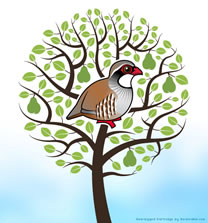| français | English | Cymraeg |
|---|---|---|
| le boulon | (nut and) bolt | bollt |
| le boulon à oreilles | wing bolt | bollt adeiniogf/asgellog |
| le verrou | bolt (on door) | bollt(en) |
| verrouiller | to bolt (a door) | bolltio (drws) |
| boulonner | to bolt (on) | bolltio |
| engloutir | to bolt (food) | llowcio/claddu/bolgian bwyd |
| boulotter | to tuck (into smth); to eat | claddu bwyd |
| accordeur de piano | piano tuner | tiwniwr pianos dyn tiwnio pianos |
| accorder | to tune (an instrument) | tiwnio |
| battre un record | to break a record | torri/curo record |
| collant | sticky | gludiog/td> |
Category: French (français)
Pull up a pew

One thing that came up in the French Conversation Group last night was church pews, and particularly how uncomfortable they are. We discovered that in French a pew is un banc (d’église).
Banc also means seat or bench, and can mean other things in combination with other words:
– banc de sable = sandbank
– banc des accusés = dock (in court)
– banc des témoins = witness box
– banc de touche = dugout
– banc des avocats = (legal) bar
– banc de brouillard = patch of fog
– banc de sable = sand bar
Banc comes ultimately from the Proto-Indo-European *bʰeg- (to bend, curve, arch), which is also the root of banque (bank) and banquet (dinner, reception, banquet), as well as bank, banquet and bench in English, and related words in other languages.
The French equivalent of pull up a pew or take a pew (take a seat, sit down), is prends-toi une chaise or tire-toi une bûche (pull up a log). Are there other ways to say this?
Sources: Reverso, Wiktionary, WordReference.com
A Tragic Goat Song

How is the word tragedy connected to goats and songs?
The answer is that tragedy comes ultimately from the Ancient Greek word τραγῳδία (tragōidía – epic play, tragedy) which comes from τράγος (trágos – male goat) and ᾠδή (ōidḗ, – song).
Apparently the goat reference comes from satyrc drama, which featured actors dressed in goatskins playing satyrs. Or because at Athenian festivals a goat was given as a prize for the best play or performance, and then sacrificed, and a τραγῳδία was a lament for the goat.
Another idea from Athenaeus of Naucratis (2nd–3rd century BC) is that the original form of the word was trygodia from trygos (grape harvest) and ode (song), as the festivals took place during the grape harvest
Tragedy entered English during the 14th century as tragedie, when it meant ‘a play or other serious literary work with an unhappy ending’. It came from the Old French tragedie, from the Latin tragoedia ([theatrical] tragedy). It came to mean an unhappy event, calamity or disaster at the beginning of the 16th century.
Sources: Wiktionary, Online Etymology Dictionary, Oxford Dictionaries, English Word Information
‘Cuisinez-Vous Le Français ?’ Mixing Learning with the Joys of Cooking

Today we have a guest post by the Language Chefs from Cuisinez-vous le français
The new online tool, ‘Cuisinez-Vous Le Français ?’ is a fun way to learn French in a friendly, foodie manner. This new method, comprising of one recipe each week using a dedicated, online platform, allows you to improve your culinary and language skills. ‘Cuisinez-vous le français ?’ provides all the ingredients needed for a successful lesson! The kitchen becomes a medium for cultural and linguistic classes as our chefs use cookery to introduce new language points and motivate you.
How it works
Subscription to the programme allows access to a new video every week. This video is made available at three speeds (slow, normal and fast) along with the subtitles, script and an easy-access dictionary. These tools have been developed with the goal of improving your pronunciation and comprehension. Our combination of theory and practice is essential in the learning of a foreign language! Subscription for a year will provide you with 52 videos, made available on a weekly basis, for 52 euros.
Un délicieux concours
Do you want to win a year of tasty French recipes? All you have to do is post your photos of these chocolate profiteroles which you have made on our Facebook page and we will reward the most original photo with a one year subscription and a ‘Cuisinez-vous le français ?’ apron! 3, 2, 1 cook!
For any information, please contact
Thibault le Marié – contact@cuisinezvouslefrancais.com – 06 47 40 40 47
http://www.cuisinezvouslefrancais.com
Wheels with teeth

I discovered last night that in French a cog is a une dent, which also means a tooth, or une dent d’engrenage (“tooth gear”), and a cog wheel is une roue dentée (a toothed wheel), which is kind of a cog looks like.
The English word cog, meaning a tooth on a gear, or a gear or a cogwheel, comes from the Middle English cogge, from the Old Norse kugg (notch), from the Proto-Germanic *kuggō (cog, notch), from the Proto-Indo-European *gugā (hump, ball), from *gēu- (to bend, arch).
A cog can also refer to an unimportant individual in a greater system, e.g. He’s just a cog in the machine, which in French would be Il n’est pas qu’un rouage de la machine – rouage is another word for cog or gearwheel, and also means part. Les rouages means machinery, as in les rouages de l’État (the machinery of state) or les rouages de l’administration (the wheels of government).
In German a cog is Zahn (tooth) and a cogwheel is Zahnrad (toothwheel). He is only a cog in a machine is Er ist nur ein Rädchen im Getriebe (“He is only a little wheel in the works/gears/gearbox”), or Er ist nur eine Nummer unter vielen (“He is only a number among many”).
Are there similar expressions in other languages about being a cog in a machine?
Sources: Reverso, Wiktionary, WordReference.com and giantbomb.com
Polyglot Pub

Last week I went to the Polyglot Pub in London. I’ve been to similar events in Manchester and Liverpool, but this is the first one I’ve been to in London. It takes place once a month, usually at Penderel’s Oak, a pub in Holborn, and this month there were about 16 people there.
The conversation was mainly in English, but I also spoke Mandarin and French, and odd bits of Russian, Czech, Slovak, Swedish, Norwegian, Portuguese, Scottish Gaelic and Dutch. Other languages were avaiable.
The next Polyglot Pub will be in the same place on the 16th February.
Do you go to, or know of, similar events elsewhere?
Weathered pagodas and stretching times

The word for weather in Russian is погода (pogoda) [pɐˈɡodə], which sounds more or less like pagoda in English.
The English word pagoda, which refers to an Asian religious building, especially a multistory Buddhist tower, comes from Portuguese pagode, which comes via Tamil from the Sanskrit भगवती (Bhagavatī, name of a goddess) or भागवत (Bhāgavata, “follower of Bhagavatī”).
In French the words for weather, temps, also means time and tense, and comes from the Latin tempus (time, period, age, tense, weather), from the Proto-Indo-European *tempos (stretch), from the root *temp- (to stetch, string), which is also the root of the English word tempest, via the Latin tempestas (storm), and the English word tense.
Breton also has one word for time and weather – amzer, which comes from the Proto-Celtic *amsterā (time, moment), which is also the root of the Irish aimsir (weather, time and tense), the Manx emshir (weather, time and tense) and the Scottish Gaelic aimsir (climate, weather, season, era, time, reign), the Welsh amser (time, age, tense), and the Cornish amser (tense).
Sources: www.study-languages-online.com, Wiktionary
I’ve started putting together a new section on Omniglot featuring weather-related words and phrases. So far I have pages in Czech, Russian and Welsh.
In the UK we talk about the weather quite a bit. It’s (usually) a neutral and uncontroversial topic, and while some people are genuinely fascinated by it, for most of us it’s just a way to start a conversation. Do people do this is other countries? Or do you use of topics as conversation starters?
Partridges and pear trees

In the song “The Twelve Days of Christmas”, the gift given on the first day is a partridge in a pear tree. As partridges nest on the ground and are unlikely to be found in pear trees, this seems a bit strange to me.
A possible reason why partridge is in the pear tree in the song is because of a mistranslation of the French perdrix/perdriole, which sound a bit like pear tree, but mean partridge. The English version was possibly based on a French folk song: there are three that feature partridges, and/or was originally a children’s game.
The lyrics of the English version of this song that are most common today were first published in 1909 by Frederic Austin, who also wrote the current melody. Other versions of the words and tune have been around at least since 1780, when the song appears in a children’s book, Mirth without Mischief, with the title The Twelve Days of Christmas sung at King Pepin’s Ball.
In the 1780 version the gift on the fourth day of Christmas is colly birds – colly was apparently an English dialect word for black. The other lyrics are more or less the same as the current version.
Sources: https://en.wikipedia.org/wiki/Partridge
https://en.wikipedia.org/wiki/The_Twelve_Days_of_Christmas_(song)
Boxing tips
Today is Boxing Day in the UK, and there are a number of ideas about the origins of the name. The Oxford English Dictionary, for example, defines Boxing Day as:
“the first week-day after Christmas-day, observed as a holiday on which post-men, errand-boys, and servants of various kinds expect to receive a Christmas-box”
The earliest attested use of the term was the 1830s.
Samuel Pepys mentions in his diary of 19th December 1663 that there was a tradition of giving tradespeople Christmas boxes of money and gifts; that servants were given a day off the day after Christmas to visit their families, and were each given a box of presents and sometimes leftover food.

The name Boxing Day may come from the Alms Boxes in churches which were used to collect donations to the poor, or to the Roman and early Christian custom of placing metal boxes outside churches to collect offerings to celebrate Saint Stephen’s day, which falls on 26th December.
On the QI Christmas Special they mention that the tradition of giving tips started in Europe, particularly in the UK, and spread to North America, where many people were reluctant to take it up at first.
In some languages words for tips show clearly what the money is for:
– Trinkgeld (“drink money”) in German
– drikkepenge (“drink money”) in Danish
– pourboire (“for drinking”) in French
– propina in Spanish – from Latin prōpīnō (I drink to someone’s health), from Ancient Greek προπίνω, from προ- (before) & πίνω (I drink, carouse).
Sources: Wikipedia, Wiktionary
What about in other languages?
Weaving applications
There was some discussion at the French conversation group last night about job applications – one member of the group has been offered a job in an international school in southern France and will be moving there soon.
The word application exists in French, but it’s not the one you use when applying for a job. Instead it is used when applying a lotion or treatment or an invention or method. Also when implementing a decision or measure or enforcing the law. It is also used for software app(lication)s.
Expressions featuring the word include:
– mettre en application = to implement, apply, enforce
– application cruciale = mission-critical application
– application informatique = IT application
– école d’application = officers’ training school
An application for a job is une demande or une candidature, and a job application form is un formulaire or un bulletin de demande d’emploi. To apply for a job is poser une candidature pour un emploi / poste or postuler / poser sa candidature pour un emploi.
The French word appliquer can mean ‘to apply (a lotion or cream; or an invention or method), to implement (a decision); to enfore (the law); or to give’. The reflexive version of this verb, s’appliquer, can mean ‘to apply oneself (to doing sth); to apply to (the law)’ and s’appliquer sur means ‘to fit over’.
The English word apply comes from French, and the French word appliquer comes from the Latin applicāre (to apply, to put, to stick, to spread; to impose, to enforce), from applicō (I apply, attach, join to), from ad- (to; towards) + plicō (fold; arrive), from the Proto-Indo-European *pleḱ- (to plait, to weave), which also the root of the English words plait, plat and pleat.
Source: Reverso